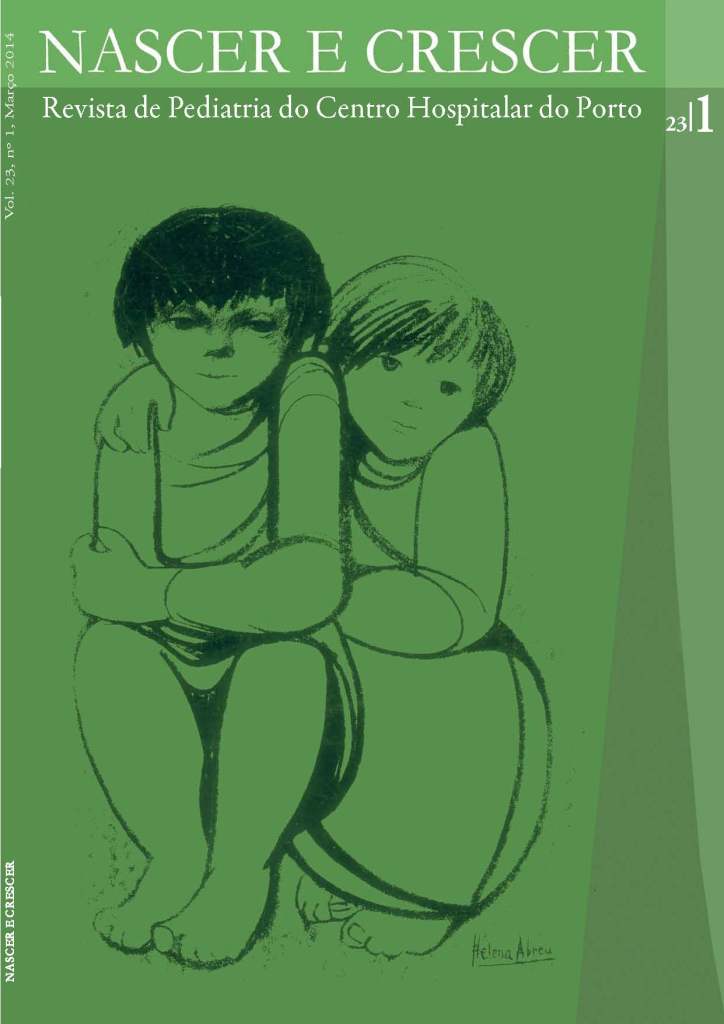Recurrent angioedema - a case report
DOI:
https://doi.org/10.25753/BirthGrowthMJ.v23.i1.8587Keywords:
C1 -INH, children, hereditary angioedema, recurrenceAbstract
Introduction: Hereditary angioedema (HA) is a rare cause of recurrent angioedema caused by a default in the gene that encodes the C1 esterase inhibitor (C1 -INH). The oedema involves predominantly the face, limbs and genital and gastrointestinal tract. The involvement of the larynx, although less frequent, is the most severe clinical expression of HA and is potentially fatal.
Case report: Clinical report of an eight-year-old female with multiple episodes of angioedema. The laboratory study confirmed the diagnosis of HA.
Discussion: HA diagnosis is established based on the clinical history, family history and complements testing. Its documentation is extremely important because it is potentially fatal and needs specific therapy.
Downloads
References
Martins P, Gaspar A, Pires G, Godinho N, Almeida M, Pinto J. Angioedema hereditário em idade pediátrica. Rev Port Imunoalergologia 2003; XI:410 -20.
Hassan G, Khan G, Qureshi W, Ibrahim M. Angioedema: current concepts. JK Science 2005; 7:133 -34.
Bingham C. An overview of angioedema: Clinical features, diagnosis, and management. Up to Date; versão 19.2. Disponível em: www.uptodate.com
Zuraw B. Hereditary angioedema. N Engl J Med 2008; 359:1027 -36.
Atkinson J, Cicardi M, Sheffer A. Clinical manifestations and pathogenesis of hereditary angioedema. Up to Date; versão 19.2. Disponível em: www.uptodate.com
Atkinson J, Cicardi M, Sheffer A. Diagnosis of hereditary angioedema. Up to Date; versão 19.2. Disponível em: www.uptodate.com
Paiva M, Gaspar A, Loureiro V, Pinto P. Angioedema hereditário – caracterização de uma população pediátrica. Rev Port
Imunoalergologia 2010; 18:157 -74.
Bowen T, Cicardi M, Farkas H, Bork K, Longhurst HJ, Zuraw B, et al. 2010 international consensus algorithm for the diagnosis, therapy and management of hereditary angioedema. Allergy Asthma Clin Immunol 2010; 6: 24 -36.
Banerji A. Current treatment of hereditary angioedema: an update on clinical studies. Allergy Asthma Proc 2010; 31:398-406.
Atkinson J, Cicardi M, Sheffer A. Treatment of acute attacks
in hereditary angioedema. Up to Date; versão 19.2. Disponível
em: www.uptodate.com
Atkinson J, Cicardi M, Sheffer A. Prevention of attacks in hereditary angioedema. Up to Date; versão 19.2. Disponível em: www.uptodate.com
Cadinha S, Castel -Branco M, Malheiro D, Lopes I. Protocolo de diagnóstico, tratamento e seguimento de doentes com angioedema hereditário. Rev Port Imunoalergologia 2005; 13:377 -93.
Papamanthos M, Matiakis A, Tsirevelou P, Kolokotronis A, Skoulakis H. hereditary angioedema: three cases report, members of the same family. J Oral Maxillofac Res 2010; 1:1 -7.
Downloads
Published
How to Cite
Issue
Section
License
Copyright and access
This journal offers immediate free access to its content, following the principle that providing free scientific knowledge to the public provides greater global democratization of knowledge.
The works are licensed under a Creative Commons Attribution Non-commercial 4.0 International license.
Nascer e Crescer – Birth and Growth Medical Journal do not charge any submission or processing fee to the articles submitted.


